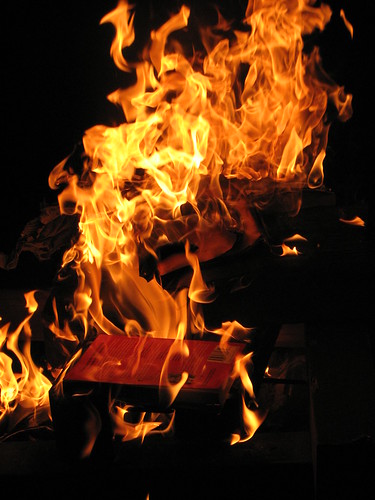Since mankind first figured out a form of writing, there have been stories and books. And for as long as there have been stories and books, there have been banned books.
Burning Down the Books
You might think Mark Twain when you hear about book bans and book burning (his stuff has been known to be controversial), but history shows us that the Romans were banning certain source material back before Jesus Christ walked the Earth. That means human beings have been trying to control the reading material of other human beings for at least 2,500 years.
Book burnings have been going on for just about as long, sometimes on a massive scale. Many ancient works that were controversial in their day have been irrevocably lost. And many people believe that today, thanks to things like the First Amendment, book banning no longer happens. Those people are wrong.
It's a tradition that's still being carried out all around the world, even in the United States. Cesar Chavez wrote a book in 2002 that was widely banned. Go back to the 1970s and you'll find plenty of books that were being banned in America. And some indie authors believe they're being banned, or at least blacklisted, even today.
Censorship is a Label, Too
The matter of modern-day banning of indie authors was recently brought to my attention by the Goodreads forums (just when I'm about to give up on forums, which I hate, I find another reason to stick). It's all about the way Amazon chooses to categorize books, you see. And it's got lots of indies angry.
Some are complaining that Amazon is giving far too many books the "erotica" label, effectively blacklisting them to other types of readers. Other authors are seeing their books be pulled from the virtual shelves because Amazon considers the story to have offensive or illegal themes. It's got lots of indies steamed, and it should. Censorship is always a heated issue, and it's bound to raise passions. Authors were given a platform to publish anything, and it's kind of hard for Amazon to start backpedaling now.
But there is another side to the erotica censorship coin. For starters, the indie market is flooded with it. According to a report from Forbes, almost one-third of all self-published titles can be given the erotic label (the findings were based on an analysis from Digital Book World). Among traditionally published titles, erotica makes up about 1 percent of ebooks in the market. And of those erotica titles, almost 10 percent of them contain themes of incest and bestiality.
I can give you an example of it: author Christie Sims. She has published more than 150 titles, and she writes about women having sex with dinosaurs. Her books are available for purchase on Amazon, because she's free to write about this subject matter. It's the kind of thing that some people will find morally reprehensible, and it's enough to make history buffs and science nerds go into an apoplectic fit (EXTINCT! Dinosaurs were EXTINCT by the time humans came around!), but it's on sale for anyone to buy. So just to imagine which books Amazon actually saw fit to ban.
Banning books is not done lightly anymore, if it ever was. It's always a decision that angers people and it almost always backfires (banned books become more popular). But when reading material contains intentionally damaging or incendiary information, the waters get a little muddy. Books that openly depict human-on-dinosaur sex may cause a gag reflex, but they are relatively harmless since they are totally impossible. Books that depict rape of a relative or a minor and other crimes...it's a bit dicier, isn't it?
Someone will always make the attempt to regulate reading material, whether it's through labeling or oppression. And people will always react to it, usually by finding a way to get to that material. So if you get banned, or mislabeled? Take heart. You're carrying on a millennium-old writing tradition.











0 comments:
Post a Comment